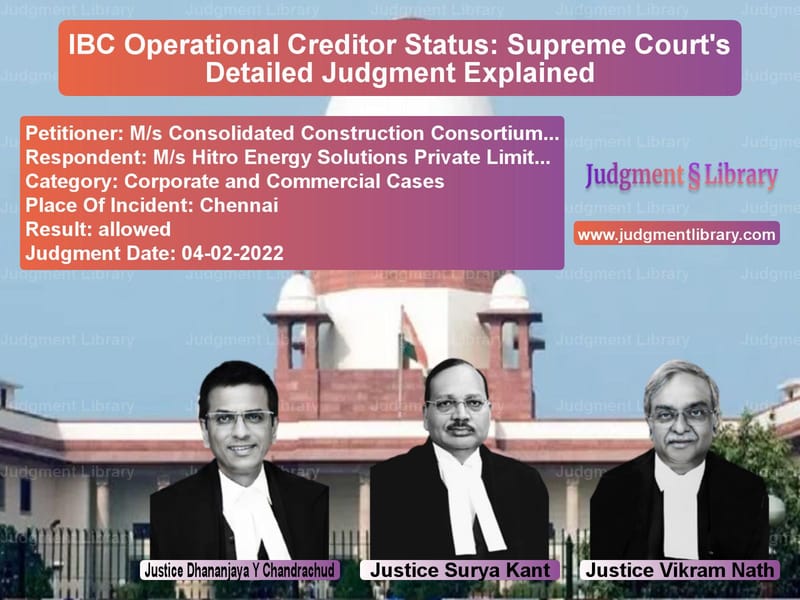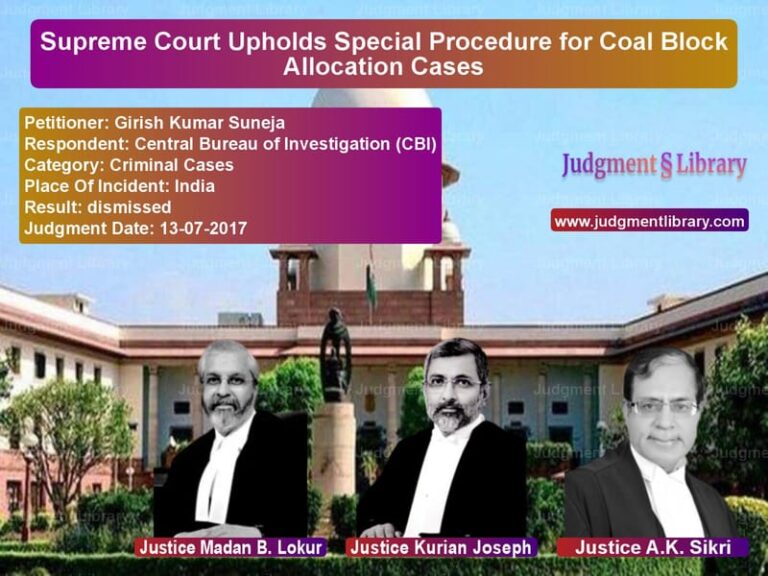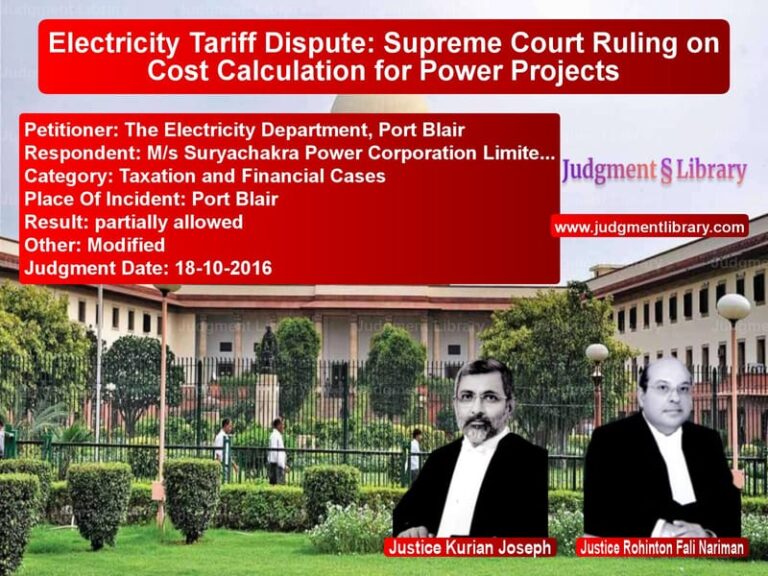IBC Operational Creditor Status: Supreme Court’s Detailed Judgment Explained
The Supreme Court’s decision in M/s Consolidated Construction Consortium Limited vs. M/s Hitro Energy Solutions Private Limited has provided significant clarification on the concept of an operational creditor under the Insolvency and Bankruptcy Code, 2016 (IBC). This case, which arose from a financial dispute, highlights the legal framework governing operational creditors and the role of a company’s Memorandum of Association (MOA) in determining liability.
At the core of this dispute is whether an entity that places an order for goods or services can qualify as an operational creditor, and whether a company can avoid liabilities by unilaterally passing a board resolution contradicting its MOA. The case also addresses the critical issue of limitation and when the period for initiating an insolvency proceeding begins.
Background of the Case
The dispute originated from a transaction between the appellant, Consolidated Construction Consortium Limited, and a Proprietary Concern named Hitro Energy Solutions. The appellant had placed orders with the Proprietary Concern for supplying light fittings for a Chennai Metro Rail Limited (CMRL) project. In response, the Proprietary Concern requested an advance payment of Rs. 50,00,000, which CMRL directly issued to it.
However, on 2 January 2014, CMRL informed the appellant that the project had been terminated. Despite this, the Proprietary Concern withdrew the Rs. 50,00,000 and refused to return the amount when requested. The appellant subsequently repaid this sum to CMRL and sought reimbursement from the Proprietary Concern. Meanwhile, on 28 January 2014, the respondent, M/s Hitro Energy Solutions Private Limited, was incorporated. The appellant argued that the respondent took over the Proprietary Concern and should be liable for the outstanding debt.
Arguments of the Parties
Petitioner’s Arguments
- The MOA of the respondent company explicitly states that one of its objectives is to take over the Proprietary Concern, making it liable for the debts of the concern.
- The amount of Rs. 50,00,000, which was an advance payment for the now-terminated contract, is an operational debt owed by the respondent.
- The appellant qualifies as an operational creditor under the IBC as the transaction involved the operational requirements of the appellant.
- The limitation period does not bar the application as negotiations between the parties continued until 2017.
Respondent’s Arguments
- The respondent company never formally took over the Proprietary Concern despite what was mentioned in its MOA.
- The dealings were strictly between the appellant and the Proprietary Concern, and not with the respondent.
- The appellant cannot be considered an operational creditor as it did not supply any goods or services to the respondent.
- The claim is barred by limitation, as the default allegedly occurred in 2013, while the application under IBC was filed in 2017.
Key Legal Issues Addressed by the Supreme Court
1. Who is an Operational Creditor?
Section 5(21) of the IBC defines an operational debt as a claim arising from the provision of goods or services. The Court clarified that the law does not specify whether the operational creditor must be the supplier or recipient. The judgment held:
“The operative requirement is that the claim must bear some nexus with a provision of goods or services, without specifying who is to be the supplier or receiver.”
This interpretation broadens the scope of operational creditors and ensures that debts arising from contracts related to operational activities are covered under the IBC.
2. Importance of the Memorandum of Association (MOA)
The MOA of the respondent stated that one of its primary objectives was to take over the Proprietary Concern. The Supreme Court ruled that an MOA is a binding constitutional document unless legally modified under Section 13 of the Companies Act, 2013. The Court noted:
“A company’s Memorandum of Association is its charter document. Unless legally amended and registered under the Companies Act, the objectives listed in the MOA remain binding.”
Since the respondent failed to provide any proof that it legally amended its MOA, the Court held that the respondent must be presumed to have taken over the Proprietary Concern, making it liable for its debts.
3. Limitation Period
The respondent contended that the limitation period should be counted from 2013, when the cheque was encashed. However, the Supreme Court ruled that limitation begins from the date of default, not the date of the debt becoming due. The Court observed:
“In cases where negotiations are ongoing, the limitation period starts from the date of final refusal to pay.”
Since the last formal demand was made on 27 February 2017 and was refused on 2 March 2017, the application filed under Section 9 of IBC on 1 November 2017 was within the limitation period.
Supreme Court’s Final Decision
After reviewing the case, the Supreme Court ruled in favor of the appellant, concluding that:
- The appellant is an operational creditor under the IBC.
- The respondent is liable for the debt since it effectively took over the Proprietary Concern.
- The application under Section 9 of the IBC was filed within the limitation period.
The Court, therefore, set aside the decision of the NCLAT and restored the ruling of the NCLT, which had initially admitted the insolvency proceedings against the respondent.
Significance of the Judgment
This judgment sets an important precedent on the interpretation of an operational creditor under the IBC. It reinforces the following principles:
- A broad and inclusive definition of an operational creditor.
- The binding nature of a company’s MOA unless legally amended.
- The importance of determining the correct limitation period based on the date of default.
By upholding the appellant’s rights, the Supreme Court has ensured that companies cannot escape liabilities merely by passing internal board resolutions. The judgment strengthens the rights of operational creditors and prevents misuse of corporate structures to evade legitimate claims.
Petitioner Name: M/s Consolidated Construction Consortium Limited.Respondent Name: M/s Hitro Energy Solutions Private Limited.Judgment By: Justice Dhananjaya Y Chandrachud, Justice Surya Kant, Justice Vikram Nath.Place Of Incident: Chennai.Judgment Date: 04-02-2022.
Don’t miss out on the full details! Download the complete judgment in PDF format below and gain valuable insights instantly!
Download Judgment: ms-consolidated-con-vs-ms-hitro-energy-sol-supreme-court-of-india-judgment-dated-04-02-2022.pdf
Directly Download Judgment: Directly download this Judgment
See all petitions in Company Law
See all petitions in Bankruptcy and Insolvency
See all petitions in Corporate Governance
See all petitions in Judgment by Dhananjaya Y Chandrachud
See all petitions in Judgment by Surya Kant
See all petitions in Judgment by Vikram Nath
See all petitions in allowed
See all petitions in supreme court of India judgments February 2022
See all petitions in 2022 judgments
See all posts in Corporate and Commercial Cases Category
See all allowed petitions in Corporate and Commercial Cases Category
See all Dismissed petitions in Corporate and Commercial Cases Category
See all partially allowed petitions in Corporate and Commercial Cases Category







